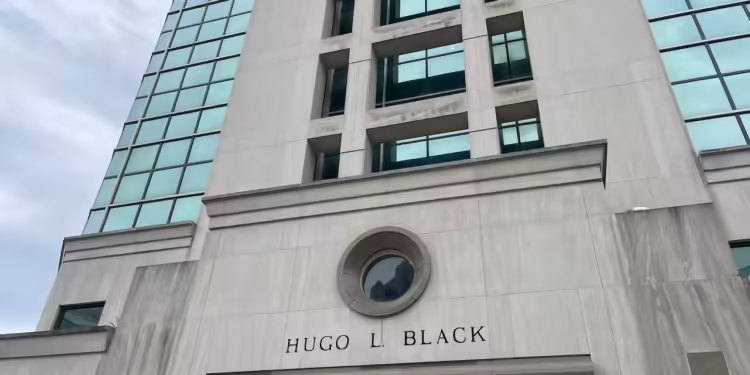Feb 10, 2025 Publisher
MONTGOMERY, Ala. — A trial began Monday, Feb. 10, in Alabama, marking a pivotal moment in a years-long battle over the state’s congressional maps and the representation of Black voters. The case has already yielded a significant victory for voters, as the U.S. Supreme Court upheld Section 2 of the Voting Rights Act in 2023, deeming it crucial for combating racial vote dilution
At the heart of the trial is whether Alabama’s congressional map, which includes only one majority-Black district, violates Section 2. A three-judge panel will deliberate on this issue, despite a prior court order mandating two districts where Black Alabamians can elect their preferred candidates.
Caster v Allen, key issues to be debated in the trial include:
- Section 2 Enforcement: Defendants argue that only the U.S. attorney general can enforce Section 2, while plaintiffs contend that private parties have the right to bring lawsuits.
- Intentional Discrimination: Defendants claim that plaintiffs must prove intentional discrimination to assert a Section 2 violation.
- Constitutionality of Section 2: Defendants argue that Section 2 is unconstitutional because it requires Alabama to draw a second district based on race.
The case began in November 2021, when two groups of voters and non-profits filed lawsuits against then-Secretary of State John Merrill and the co-chairs of the Legislative Committee on Reapportionment challenging the congressional map drawn by legislators after the 2020 census. They alleged the 2021 map diluted the voting strength of Black Alabamians by packing some into District 7, which contains parts of the Birmingham and Montgomery metropolitan areas, and cracking the rest among majority-white districts. The two lawsuits were later consolidated.
According to the plaintiffs, the legislature rejected requests to test whether the map satisfactorily distributed Black voters in accordance with the VRA. It is unconstitutional to use race as the predominant factor in redistricting except under very narrow circumstances to comply with the VRA. Although Black Alabamians make up 27% of the state’s voting-age population, they have the opportunity to elect a candidate of their choice in only 14% of congressional districts (or one out of seven).
“The Legislature enacted this plan even though it could have more naturally drawn a second majority-Black Congressional District that complies with traditional redistricting principles, like maintaining whole counties, and respects the contiguity and communities of actual interest in the Black Belt counties,” the complaint reads.
In January 2022, a federal court ordered Alabama to stop using the 2021 map and to draw a new map that included two districts where Black voters could have an opportunity to elect candidates of their choice. The defendants appealed and the Supreme Court paused the order, allowing the 2021 map to be used during the 2022 midterm elections.
But in June 2023, the Supreme Court upheld the decision blocking the 2021 map and determined that plaintiffs “demonstrated a reasonable likelihood of success on the claim” that the map violated Section 2.
Alabama at this point enacted a new map to resolve the likely Section 2 violation of the 2021 map. However, the map they adopted in July 2023 still had only one majority-Black district.
Days after the 2023 map passed, plaintiffs challenged it on the basis that it failed to provide two districts where a Black-preferred candidate has a meaningful chance of being elected, as the court ordered. In September 2023, the federal court temporarily halted the use of the 2023 map and ordered a special master and cartographer to draw a new map for the 2024 election. Alabama appealed to the Supreme Court once again to pause the decision but was denied.
The remedial plan created two districts where Black Alabamians could have an opportunity to elect a candidate of their choice. In 2024, the second majority-Black district elected Rep. Shomari Figures (D), making it the first time Alabama sent two Black representatives to Congress.
In February 2024, the defendants moved to dismiss the new complaint, arguing private parties cannot bring lawsuits under Section 2. Rather, they assert that only the U.S. attorney general can enforce Section 2. Additionally, defendants argue that plaintiffs need to show they are excluded from participating in the political process in addition to having an unequal opportunity to elect representatives of their choice. Since Black Alabamians can register to vote, participate in political parties, and vote, defendants argue they have equal access to the political process and therefore cannot bring a Section 2 claim.
Plaintiffs pushed back, saying Supreme Court precedent does not and has never required a minority group to prove they are excluded from effective participation in political life. The Supreme Court instead uses the long-established Gingles factors to determine whether a map dilutes voting power for minority groups.
The U.S. Department of Justice (DOJ) under the Biden administration also weighed in on the enforcement of Section 2 in March 2024. It defended the rights of private plaintiffs to bring Section 2 claims, writing, “The structure of the Act, Supreme Court precedent, and congressional ratification make clear that Section 2 can be enforced by private plaintiffs.” The new Trump DOJ has not indicated that they will change their position on this issue.
After a denial of the defendants’ motion to dismiss, the case heads to trial where they will continue to argue that Section 2 cases can only be brought by the attorney general. Defendants will also allege that plaintiffs must prove intentional discrimination to assert a Section 2 violation and that Section 2 is unconstitutional for requiring Alabama to draw a second district based on race.
The three-judge panel that will be hearing the trial is made up of two Trump appointees and one Clinton appointee.
The National Redistricting Foundation is one of the legal representatives in the joined cases, along with several others including the NAACP Legal Defense Fund.
Marina Jenkins is the executive director of the National Democratic Redistricting Committee, an affiliate organization which is chaired by Eric Holder, a former U.S. attorney general in the Barack Obama administration.
The Supreme Court ruled in the Allen v. Milligan case that Alabama’s 2021 congressional voting maps diluted the power of Black voters, in violation of the Voting Rights Act of 1965. The Republican-controlled legislature then pitched a new map that still featured just one majority Black district. That map was also tossed out. Finally, a new map was drawn and approved under federal court oversight.
Before the ruling, Alabama, which is about 27 percent Black, currently had just one Black member in Congress – Rep. Terri Sewell, D-Birmingham.
The trial could last up to three weeks.
Source: Democracy Docket

















